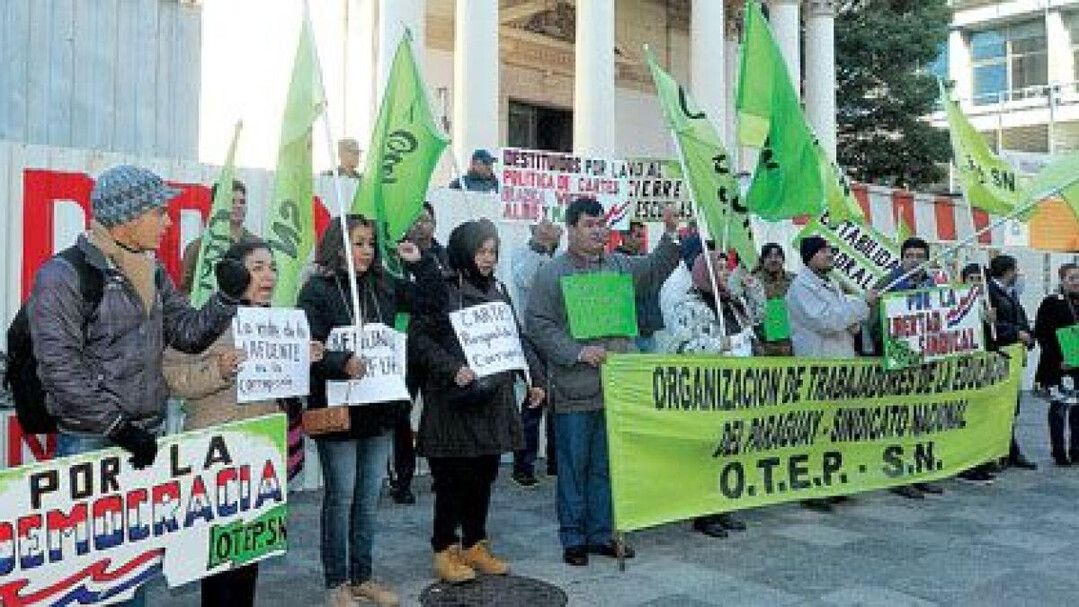
ASUNCIÓN, Paraguay – The Paraguayan Education Workers' Union-National Union (OTEP-SN) has announced a nationwide teachers' protest for Friday, May 30, aiming to expose severe issues within the education sector. The demonstration, expected to draw a large number of teachers to the capital, Asunción, will focus on highlighting the dire situation of educators, who claim they are overwhelmed by excessive administrative tasks and neglected by the Ministry of Education (MEC).
Drowning in Administrative Tasks, Losing Sight of Core Educational Role
Blanca Ávalos, a leader of OTEP-SN, criticized the MEC for offloading an enormous amount of administrative and bureaucratic responsibilities onto teachers without providing adequate technical or financial support. "There's so much paperwork that we don't have time to teach," she emphatically stated, pointing out that teachers are being bogged down by administrative duties rather than focusing on their primary educational roles.
One of the key issues highlighted is the implementation of Resolution 376, concerning 'reasonable adjustments' for students with disabilities. This resolution not only mandates the creation of individualized learning plans for each student with disabilities but also forces teachers to generate reports for administrators and supervisors. Ávalos argued, "The Ministry of Education is not strengthening inclusive educational institutions, and it's passing on the roles of specialists to teachers. This is imposing too much workload on educators."
Furthermore, she mentioned that educational projects like 'Ñe'êry' and 'Sumar' demand physical proof of work without actual financial backing. "The proof requires money, but there's no financial support," Ávalos lamented, stating that teachers are forced to bear all these costs themselves.
'Zero Hunger' and MEC's Punitive Approach
The recently launched 'Zero Hunger' program is also imposing additional workload on teachers. All administrative tasks related to this program, including registration, report writing, and system input, fall on the teachers. In conjunction, other programs such as NELI in DUA (Universal Design for Learning) are further exacerbating the teachers' burden.
Moreover, the MEC's punitive approach is intensifying teachers' grievances. "Each resolution comes with a warning: 'Be careful.' For example, if you don't comply, you'll face disciplinary action or penalties," Ávalos said, fiercely criticizing, "It feels like the educational methods of the dictatorship era [Alfredo Stroessner] have returned."
Unprepared System, 'Inclusive Education' in Name Only
Noelia Caballero, another representative of OTEP-SN, noted that the May 30 protest coincides with OTEP-SN's founding anniversary. She emphasized that through this demonstration, they aim to "resubmit a statement to the Ministry of Education opposing the bureaucratic paperwork and the lies of inclusive education."
Caballero warned that Paraguay's educational system lacks the infrastructure or specialists for genuine inclusive education. "I am not a psycho-pedagogue, nor a speech therapist, nor a psychologist. I cannot make judgments about students based on just a few indicators," she asserted, underscoring that the absence of specialized personnel places an excessive burden on teachers.
Deteriorating Mental Health and Teachers Reduced to Administrators
Caballero cautioned that the excessive workload is leading to the deterioration of teachers' mental health. "Today, teachers' mental health is completely broken," she said, expressing deep concern that "we are neglecting the educational aspect and becoming administrative civil servants."
Teachers are strongly demanding that the MEC re-examine the resolutions unilaterally imposed, ensure practical conditions for genuine inclusive education, provide technical teams and financial support for educational projects, and respect the labor rights of education workers.
"We are daily overloaded with tasks that don't pertain to us. We are forced to work unpaid during breaks, at night, on weekends, and on holidays. This even takes away time teachers could spend with their families," Caballero passionately stated.
This protest is poised to be a pivotal moment, shedding light on the fundamental problems within Paraguay's education system and the dire working conditions of its teachers, while urging the educational authorities to enact substantial change. Will the MEC heed the teachers' voices and devise practical solutions?
[Copyright (c) Global Economic Times. All Rights Reserved.]






























